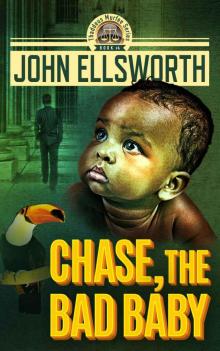- Home
- John Ellsworth
Attorney at Large (Thaddeus Murfee Legal Thriller Series Book 3) Page 3
Attorney at Large (Thaddeus Murfee Legal Thriller Series Book 3) Read online
Page 3
Much to the dealer’s dismay, after an hour she was still flush—$500 ahead, in fact.
Thaddeus couldn’t stop smiling at the look of consternation on the dealer’s face. He had found that she was an expert gambler. And maybe, just maybe, she was counting.
So Thaddeus continued watching.
If she was counting, out she would go as casinos abhorred card counters and routinely bounced them out the door.
Plus...there was something about her. Something familiar that he couldn’t quite conceive into a full thought.
So he watched and watched.
Card counting was a mathematical exercise where the practitioner gave a +1 to some cards, a -1 to some cards, and a 0 to some cards. In that way the counter could knowledgeably estimate what card the dealer would turn over next. The more cards that were dealt, the more accurate the knowledge became and the more self-confident the bets. When the count reached +4 to +8 you would see the heavy bets come pouring onto the table. But when it submerged to a -1 to -8 the card counter might be betting one chip per hand—just so they weren’t too obvious, which they would be if they stopped betting altogether.
So it was the timing of the bets Thaddeus was watching.
Plus that face.
He couldn’t quite make it out, not from his angle.
Card counting wasn’t illegal. He just didn’t like it going down in his casino.
Neither did any of his competitors along the Strip. Get caught counting and they banned you. They emblazoned you with the modern-day equivalent of the “A” for adulterer. They ruined you by mailing your photo to every corner of the globe where there was a casino.
Which spelled ruin for the counters.
The other casinos reciprocated with the pictures of counters caught in their nets. Together, everyone avoided significant losses by their ad hoc network. It was a kind of quality control where the owners made sure everyone had a little fun, but not too much.
Kiki was a graduate of UCLA with a degree in mathematics and a minor in communications. Her honors thesis had been mathematical probability, so intellectually she was a universe above everyone who was being paid to catch her. But she was doing graduate study in the school-of-hard-knocks with a major in card counting. Her plan was to become a top blackjack player and travel. She planned to live an opulent lifestyle and gamble in the cities where gaming was legal. She was even thinking of opening a 401(k). If she put in $1,000 a day she could retire in three years. That was as far as she had thought out any kind of plan. Win big, save big.
She won a $200 bet and leaned closer to the table, which, to Thaddeus, might be her tell, her giveaway.
So he watched her closely.
Before heading to Vegas, Kiki had turned down three proposals from hopeful young men in college.
First there had been the academician, whose brilliance ran to microbiology and grad school. This was the man her father favored.
Not Kiki. She knew she would wind up supporting him for seven years while he pursued a Ph.D., so she declined the fellowship.
Then there was the athlete, a wide receiver for the Bruins who stood 6-4 and tipped the scale at 205 and could out-leap a gazelle. But he had wrecked his knee against Stanford and she didn’t care to spend her life hearing about what might have been, while he coached Pop Warner and ate his heart out.
So she put him on waivers.
Then there had been the musician, a guitarist whose riffs reminded everyone of Eddie Van Halen. But he couldn’t keep his privates in his pants, so she declined to wager her perfect health against HIV every time she got it on with him.
In the end, she had packed up her Bug convertible and headed north the day after graduation, in search of her own success.
Now she played only the super casinos.
One night she would hit the Mirage, the next night Mandalay Bay, then the Bellagio, Circus Circus, Luxor, MGM Grand, and Thaddeus’ place, the Desert Riviera.
She knew it was owned by Thaddeus Murfee.
She knew everything about him.
And she knew that he was watching her. Only he didn’t really know why, but she did.
She started winning after an hour, raking in earnings more often than giving up wagers. Not enough to draw attention, just enough to keep the lights on and the cat happy with connoisseur tuna.
He saw that she was doing what card counters did best. She was placing small bets and counting cards while waiting for the percentages to change. When the percentages changed the light flipped from yellow to green. Then the big bets would be placed. The counters would step up and bet amounts as large as $500 a hand, then $750, then $1000, then $2500.
He wouldn’t let that go on very long.
He would eighty-six her first.
With studied ease, she slid a stack of black chips worth $500 across the green felt.
Twenty feet away Thaddeus watched her place the bet and it immediately caught his eye.
The floor shift manager next to him, he could feel him stiffen, too. His job was to spot card counters, just like Thaddeus, and just like the dealer.
They knew that normally the casino had a two percent edge on blackjack, but that the capable card counters could quickly turn those odds around until they climbed as high as eight percent in favor of the player. Such odds were intolerable in casinos not just in Las Vegas but worldwide.
Thaddeus tried not to gawk at the young woman’s play.
Like all good snoops, he was tall, 6-3, and even from a distance he could look down on her cards. She was showing a jack and a king on the $500 wager.
When she looked away he took three quick steps toward her.
It was not the amount of the bet that caught his eye and the eye of the shift manager. She was only betting $500 on the hand—a very small bet inside the rope.
And they had seen them all, from the $100 a hand to the $200,000 a hand gamblers, truckers to oil sheiks, and the size of the bet meant nothing.
But what piqued their interest was the timing of the young woman’s bet.
Until that bet, she had bet the table minimum of $100 per hand, occasionally $200. Whether she won or lost didn’t seem to matter, for she bet one black chip and only one.
Until now.
Now she had shoved out $500 and was trying to make it look as casual as checking out at 7-Eleven. Casual she wasn’t. She twirled the sorority charm. He smiled.
She wasn’t even aware of it. The touching of the necklace, the twirling of the charm, was her tell, her giveaway. Which meant there was blood in the water. The odds had shifted her way and Thaddeus and the shift manager were guessing she knew it.
Thaddeus moved in on her.
6
In most casinos the game of twenty-one is called blackjack.
It is the most popular casino game in America.
The object of blackjack is to get blackjack (twenty-one) without busting.
A player gets blackjack by receiving cards that add up to twenty-one. Face cards count ten, the ace can be one or eleven—the player’s choice—and all other cards count at their spot value. Five spots and it is a five; nine spots and it is a nine, and so it would go.
And there was one other important rule. The dealer had to hit sixteen and had to stand on seventeen or above.
In other words, if the dealer had a face card (ten) and a six, he had to take another card.
What would he get?
A high card that put him over twenty-one and a loss?
Or would he get a low card that totaled him up to twenty or twenty-one?
Here was where card counting entered in.
Kiki Murphy knew when the odds were high for a high card to be dealt, and she knew when the odds were high for a low card to be dealt.
By wagering these odds, she was increasing her chance of making the mortgage payment before Friday.
He was still watching and had just about made up his mind. She was just the kind of player he definitely did not want taking swings inside the high-r
ollers rope.
From his vantage point, it appeared certain that Kiki, with two face cards, was about to win her $500 bet. She was showing the king of hearts and the queen of clubs. One of the dealer’s cards was face down—this was his hole card—and his other was face up. It was the six of clubs.
The worst possible hand for the dealer was a six. Whenever a dealer had a six showing, veteran players knew he was probably going to exceed twenty-one points because he had to hit sixteen.
So Thaddeus knew that if the dealer had a face card down, he would have to flip it over and then hit the sixteen, which meant if he got over five he would bust.
Plus he knew that the odds of going over five were higher than the odds of going under, because there were more cards above five than below.
Blackjack was only a game, but it relied on mathematics and right then Kiki’s bets held the advantage.
The question for Thaddeus remained: did she know she had a mathematical advantage or was she only hitting a streak of good luck? Good luck was always temporary. Card counting could eventually break the bank.
And Las Vegas management never wanted to see the bank go bust.
Having the mathematical advantage was supposed to be the house’s side, not her side.
So he moved a little closer.
Now he could smell her perfume.
It was a familiar smell, and his senses searched for a connection for another place, another time when he had come into contact with the perfume.
He kicked himself back to reality. Forget the perfume. If she were counting cards, she was about to be escorted out of the casino and told that she had been photographed and that she was never to return, under painful penalty.
He sidled two steps closer.
Then he made the fragrance: Balencia Paris, not a cheap stroke. So she enjoyed exquisite perfumes. Another two steps and he could reach out and touch her shoulder.
Which he did not do.
Instead he accepted a watery glass of Pepsi from a passing cocktail waitress, who was wise to his hustle and knew that he wished to appear to anyone watching like he was another cheap spectator out for a night of free drinks and some free gawking.
Then something incredible happened.
As he watched, Kiki split her cards.
This meant she moved the king next to the queen so they now lay side-by-side on the table.
The dealer looked up. He was surprised, like Thaddeus. “Are you splitting your cards?” he asked her.
“Yes,” she replied.
Which caused Thaddeus even greater concern. The amateur would have stayed, showing twenty between the two face cards, and simply waited for the dealer to bust, raking in a pot of $500 on the hand. But not this gal. She was now playing two hands at once, by the split.
She slid five more black chips across the green felt to cover the second hand. She was betting $1,000 on the game.
The dealer dealt a new card from the shoe and placed it on her king.
It was the ten of hearts, which gave Kiki twenty points on her first hand.
Thaddeus watched her closely; her face—from the side—never changed expression. No tell.
This time she didn’t twirl the sorority charm.
It was almost like her skill was improving as he watched.
She waved her hand across the king and ten, indicating she wanted no more cards there. She then waved her hand over the queen as if to say “come here,” and the dealer dealt her a card for the queen. It was the nine of spades and Kiki waved her hand over these two cards, indicating she wanted no more for her second hand.
The hand signals were required because the eye-in-the sky couldn’t hear words, it could only pick up actions.
Somewhere up above, the prodigies in the surveillance room were watching all tables to spot cheating on either side of the deck. When Kiki put her cards side by side, the cameras knew she was splitting her hand. Eyes focused in on her. When she waved her hands over the cards the cameras knew she was ready to see what the dealer turned over. Every move was choreographed so the geniuses would instantly understand the drama playing out below their feet without anyone speaking a word.
She was now showing nineteen on one hand and twenty on one hand.
And it was time for the dealer to turn over his hole card.
He deftly flipped it up.
Queen of spades. Now he was showing sixteen, which meant he had to hit it.
Thaddeus watched her face and hands even closer.
Her expression never changed. Not a muscle moved. There was no glee, which would have telegraphed that she knew she was about to win; there was no alarm, indicating trouble ahead. There was nothing. Just the look of a twenty-something who might be sitting through a college class taking notes in freshman statistics.
Thaddeus was puzzled but he wasn’t ready to act.
Not yet.
Why?
She could still be innocent, unaware of the mess she was creating for the house. They gave her the benefit of the doubt.
The dealer dealt one more, the ten of diamonds, and he was bust. Twenty-six.
The dealer counted out five black chips and slid them out next to Kiki’s ten black chips. He counted out another five black chips and slid them out to her second hand.
They lay there, twenty black chips worth $100 apiece, untouched by her.
Yet.
Instead of gathering in her winnings, Kiki slowly took a drink of iced tea and counted her four remaining chips—$400 to leave with if she lost the next hand; $4,000 to take home if she won.
She waved her hand, indicating she was ready to begin play. She was letting her winnings ride, so she was now betting $2,000; another win would net her $4,000.
They searched her name at that moment.
She had been greeted by the Desert Riviera hostess when she entered the high-limit gaming area. The hostess had tipped off the shift manager and he had entered Kiki’s name into a wall-mounted computer at his station.
A flood of data on the young gambler was immediately returned.
Had Thaddeus seen it, he would have been shocked.
* * *
Kiki was twenty-three, single, lived alone in West Mountain Valley—an upscale condo development with all amenities—had no known means of support, owed $65,000 in student loans, $4,500 on a Visa charge used to purchase a sectional and coffee table for her living room, subscribed to HBO but not to Showtime or Cinemax, watched three hours of cable a night, and had her hair styled every two weeks.
Male callers were infrequent, although there had been one baccarat dealer who had stayed over twice, but since he worked at the Luxor there was no conflict.
Her Facebook page was the usual leftover college chums who were moving along with new lives and beginning to post birth photos of new family members.
Her favorite movies were action-adventure, and she had read Divergent and Fifty Shades of Grey in the past three months. She gave both books five stars.
Most important, she owed $350,000 on her condo. Her physician father had co-signed, and she had never been later than the ten-day grace period, though she had come close twice in the past eight months.
* * *
Thaddeus moved behind her and then to her left. He didn’t want to be seen—he hoped he wasn’t—but he needed a better view of her.
With $2,000 at risk, Kiki received a ten of hearts and the ace of diamonds.
Blackjack!
An automatic twenty-one points.
Which pissed Thaddeus just a little. That was too easy and it told him nothing about her skill.
The payoff on a blackjack is 150 percent, so she had won $3,000 in less than ten seconds. She now had $5,000 in the pot.
Despite Thaddeus’ own efforts at staying poker-faced, he had to frown. This was not headed in a good direction. She could catch fire if the math was in her favor and she could quickly win twenty or thirty thousand dollars. Plus, winners magically attract other gamblers, which put the shoe—the rema
ining cards—at higher risk of paying off to even more people.
Now he closed up the last step.
He was at her shoulder and he could sense she was uncomfortable with him there. Still, crowding around a hot Vegas table was common, so she shrugged it off.
She left $2,500 on the table for her next bet and raked in $2,500.
Two more players bellied up to the table.
Obese thirty-year-old guys in new jeans, starched western shirts with the fold lines still in the fabric, and new cowboy hats. The stylistic implications of their clothing only went so far, as one was wearing white Nikes and one was wearing tasseled loafers. Not exactly cowpoke. They were out from Ohio for a three-day poker drive at the Desert Riviera and were down $2,000 in two days. The idea of a hot table reeled them in like starved fish.
Thaddeus paid them little attention. Nothing hip, slick, or cool going on there. Just drugstore cowboys looking to get drunk, win big, and be somebody.
The deal went around. Kiki got a queen. The drugstore cowboys hauled in a nine and a seven.
The deal repeated and Kiki got a second queen. The twosome got a queen and a jack, respectively.
The dealer now had an eight showing. Not a great look this time, either, for the house.
Thaddeus and the shift manager watched closely.
Would she again split her cards like she had with the exact same cards last time?
She suddenly waved her hand over her cards. She was going to stand on twenty.
Thaddeus wondered why she hadn’t split this time. Was she that good that she had made him and was now looking like a rank amateur? Or was she just having a short run of luck?
The guy with nineteen stayed. The guy with seventeen took a hit, got a seven, and busted. He was out. He pushed off from the table and jiggled the watery drinks when he slammed his fist against the table. “Damn!” he cried and backed away, down another $100.
The dealer flipped over the hole card. Six of spades. Which, added to his eight, gave him fourteen points. He was required to draw another card. Four of hearts. Now he had eighteen and couldn’t take another card, so Kiki’s twenty won and the cowboy with nineteen won.

 Girl, Under Oath (Michael Gresham Series)
Girl, Under Oath (Michael Gresham Series) The Fifth Justice (Michael Gresham Legal Thrillers Book 10)
The Fifth Justice (Michael Gresham Legal Thrillers Book 10) Michael Gresham (Book 5): Sakharov the Bear
Michael Gresham (Book 5): Sakharov the Bear Voices In The Walls: A Psychological Thriller (Michael Gresham Series)
Voices In The Walls: A Psychological Thriller (Michael Gresham Series) Chase, the Bad Baby: A Legal and Medical Thriller (Thaddeus Murfee Legal Thriller Series Book 4)
Chase, the Bad Baby: A Legal and Medical Thriller (Thaddeus Murfee Legal Thriller Series Book 4) The Girl Who Wrote The New York Times Bestseller: A Novel (Thaddeus Murfee Legal Thrillers Book 8)
The Girl Who Wrote The New York Times Bestseller: A Novel (Thaddeus Murfee Legal Thrillers Book 8) The Defendants: Crime Fiction & Legal Thriller (Thaddeus Murfee Legal Thriller Series Book 1)
The Defendants: Crime Fiction & Legal Thriller (Thaddeus Murfee Legal Thriller Series Book 1) Hellfire (Sisters In Law Book 2)
Hellfire (Sisters In Law Book 2) A Young Lawyer's story
A Young Lawyer's story Annie's Verdict (Michael Gresham Legal Thrillers Book 6)
Annie's Verdict (Michael Gresham Legal Thrillers Book 6) Legal Thriller: Michael Gresham: Secrets Girls Keep: A Courtroom Drama (Michael Gresham Legal Thriller Series Book 2)
Legal Thriller: Michael Gresham: Secrets Girls Keep: A Courtroom Drama (Michael Gresham Legal Thriller Series Book 2) 30 Days of Justis
30 Days of Justis Sakharov the Bear (Michael Gresham Legal Thrillers Book 5)
Sakharov the Bear (Michael Gresham Legal Thrillers Book 5) Defending Turquoise (Thaddeus Murfee Legal Thriller Series Book 5)
Defending Turquoise (Thaddeus Murfee Legal Thriller Series Book 5) The Near Death Experience (Thaddeus Murfee Legal Thriller Series Book 10)
The Near Death Experience (Thaddeus Murfee Legal Thriller Series Book 10) Unspeakable Prayers: WW II to Present Day (Thaddeus Murfee Series of Legal Thrillers)
Unspeakable Prayers: WW II to Present Day (Thaddeus Murfee Series of Legal Thrillers) Attorney at Large (Thaddeus Murfee Legal Thriller Series Book 3)
Attorney at Large (Thaddeus Murfee Legal Thriller Series Book 3) The Law Partners (Michael Gresham Legal Thriller Series Book 3)
The Law Partners (Michael Gresham Legal Thriller Series Book 3) Annie's Verdict
Annie's Verdict The Mental Case (Thaddeus Murfee Legal Thriller Series Book 6)
The Mental Case (Thaddeus Murfee Legal Thriller Series Book 6)